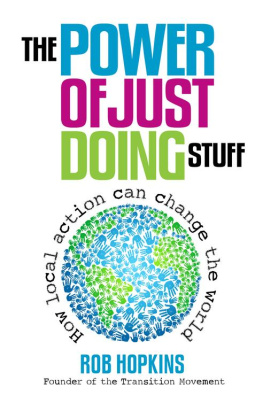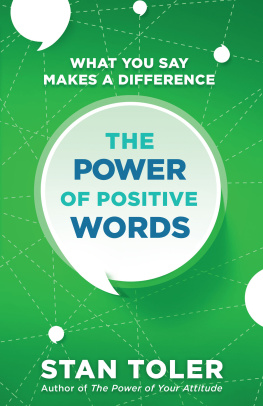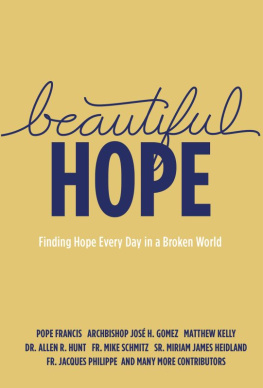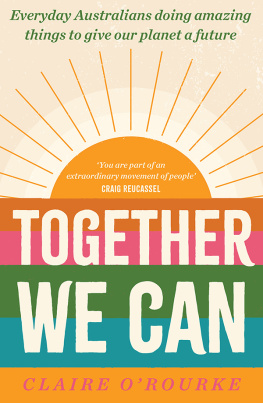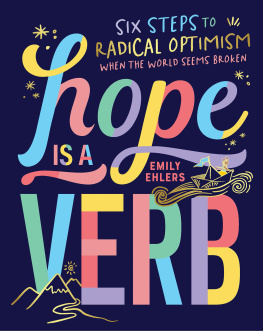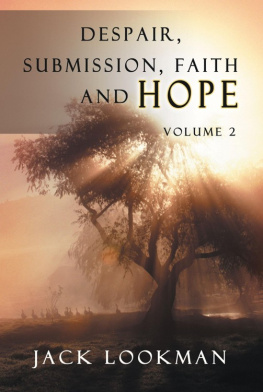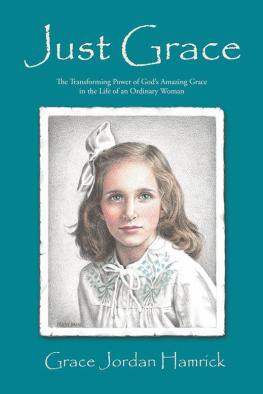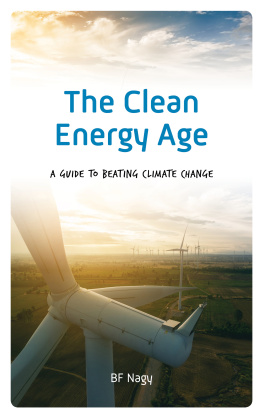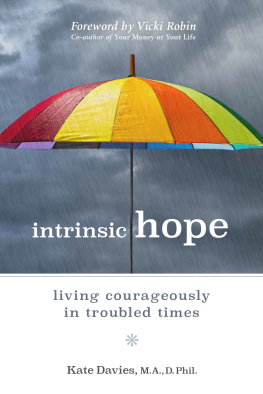Praise for Changemakers
Lots of us would like to stop global warming and endless war, end poverty, save the environment, etc. But none of us seem able to get it done. What can we do? Weller and Wilson show that we can change ourselves: how we live, what we eat, where we gather, how we interact. And out of many little personal changes may come bigger changeswithin our families, communities, and the world beyondleading to different, better outcomes.
Dmitry Orlov, author, Shrinking the Technosphere
Fay Weller and Mary Wilson have written an inspiring book about how individuals can take actions that lead to transformative social change. From the first rousing story about Anna and her efforts to deal with an inane restriction on selling fresh eggs, to a description of how personal change occurs, through a wide-ranging collection of personal stories about people taking action in their communities, this is a stimulating book about how all of us can contribute to compassionate and positive change.
Peter Robinson, former CEO of the David Suzuki Foundation
Changemakers is an accessible call to action for everyone. If were going to find ourselves out of the ecological cul-de-sac that we find ourselves in, this is one more call to mobilize everyday life.
Am Johal, Director,
SFUs Vancity Office of Community Engagement,
SFU Woodwards Cultural Unit
In turbulent times, we need threads of hope from which to weave our convictions into actions. If you want a guide to such action, one that is hopeful, inspiring, and practical, look no further. You have found it.
Dan Pratt, 3M National Teaching Fellow,
Professor Emeritus & Senior Scholar,
Centre for Health Education Scholarship,
Faculty of Medicine, University of British Columbia
This is a book that traces the path from here to there: from the individual to the wider world and from the noxiousness of the present to the possibilities of the future. It does so through the stories of people in island communities who make small changes with big implications.
Warren Magnusson, author,
Local Self-Government and the Right to the City,
Politics of Urbanism, and The Search for Political Space
Copyright 2018 by Fay Weller and Mary Wilson. All rights reserved.
Cover design by Diane McIntosh.
Cover image iStock (455586275).
Printed in Canada. First printing May, 2018.
This book is intended to be educational and informative. It is not intended to serve as a guide. The author and publisher disclaim all responsibility for any liability, loss, or risk that may be associated with the application of any of the contents of this book.
Inquiries regarding requests to reprint all or part of Changemakers should be addressed to New Society Publishers at the address below. To order directly from the publishers, please call toll-free (North America) 1-800-567-6772 or order online at www.newsociety.com
Any other inquiries can be directed by mail to
New Society Publishers
P.O. Box 189, Gabriola Island, BC V0R 1X0, Canada
(250) 247-9737
LIBRARY AND ARCHIVES CANADA CATALOGUING IN PUBLICATION
Weller, Fay, 1958, author
Changemakers : embracing hope, taking action, and transforming the world / Fay Weller and Mary Wilson.
Includes bibliographical references and index.
Issued in print and electronic formats.
ISBN 978-0-86571-875-3 (softcover).ISBN 978-1-55092-668-2 (PDF).ISBN 978-1-77142-263-5 (EPUB).
1. Sustainable living. 2. Human ecology. 3. Social ecology. 4. Social change. 5. Transformative learning. I. Wilson, Mary, 1958, author.
II. Title.
GE196.W45 2018 | 640.286 | C2018-901327-3 C2018-901328-1 |

New Society Publishers mission is to publish books that contribute in fundamental ways to building an ecologically sustainable and just society, and to do so with the least possible impact on the environment, in a manner that models this vision.

Contents
Preface
Where are we going?
And what am I doing in this handbasket?
A FAVORITE FRIDGE MAGNET SAYING
Our world seems beset by crises. For us, climate change is the defining issue of our timebut we know many intelligent people who point to the refugee crisis, war, poverty, human rights atrocities, pollution of all sorts, and the ongoing struggle against totalitarianism as the primary problem we all face. And although this is an exhausting list, it is not an exhaustive one.
Even if we dont feel like were all going to hell in a handbasket, it is easy to feel despair in the face of these vast, interlocking problems.
We began this book because we were looking for reasons to choose hope over despair. We find these reasons in the stories of transformation and learning that we share here, and in the idea of transformational learning as a way of moving through the crises that surround us.
What we have realized is that neither hope nor despair is sufficient, and neither is entirely relevant. Both hope and despair are emotions that are focused on the future rather than the present. The process of building a society that is based on compassion and care for the Earth and all its beings, human and otherwise, is not something that can happen only in the future. It can and must happen now. And, fortunately, for the sake of our collective future well-being, it is happening now. In this book, we explore the stories and experiences of individuals who are living as if the world is changing into that compassionate and caring society and, by so doing, are changing the world.
In exploring these peoples stories, we are not advocating a response to climate change or any of the other issues that stop with the personal; what we are advocating is an acknowledgement of the central importance of personal change and learning in changing our world. Because all changes are initiated by peoplebe they individual, community, corporate, or broader changesall change is, in part, personal change. The people we write about here have found ways to maintain hope while acknowledging despair, and to build lives based on integrity and concern for the Earth and its inhabitants. As they have done this, they have begun to challenge and change the stories and structures that support the world as it isand perhaps change other peoples stories as well.
We are writing from Canadas Gulf Islands, and many of the stories we share come from the Gulf Islands too. We are located in the southwest corner of British Columbia, just north of the San Juan Islands in the United States of America. However, while the majority of stories are from the islands, they could happen anywhere. They are tales of ordinary people embracing hope, taking action, and transforming the world.
We start our book with a section we call Changemaking, beginning with a story about eggs. In the second chapter, we talk about transformationwhat we mean by it and how it comes about. The third chapter talks about ways we learn. In the fourth chapter, we discuss how transformation and learning can come together to create value-driven change at the individual, community, and societal levels. In Section B, Stories and Reflections, we hear from people as they tell their stories of transformation. We hear how change has happened through peoples experiences with food, shelter, transportation, waste, energy, and economics. Each chapter is introduced with a quick overview of the issue addressed in various ways in the stories. The stories are followed by our reflections. The final chapter in this section provides a discussion about the path forward. The book closes out with our Changemakers Manual, proposed as a guidebook for anyone, anywhere who wants to be part of co-creating a new society.
Next page

